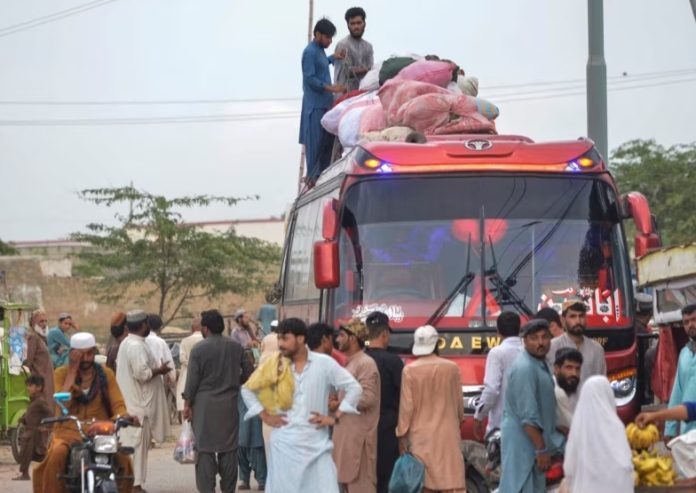Pakistani authorities on Wednesday began arresting and deporting Afghan refugees who had failed to leave the country, according to Acting Interior Minister Sarfraz Bugti.
Pakistan is carrying out a crackdown on undocumented foreigners in Pakistan. This measure is part of Pakistan’s new anti-migration policy and affects about 2 million Afghans. Sarfraz Bugti said:
“There will be no compromise against illegal refugees. We have the data on who are staying illegally in Pakistan. We are going door to door, and we have done geofencing. We will detain and deport them. We have arrested dozens across the country so far, including in the capital.”
Bugti said the Afghans would be taken to the border in buses, trucks or any other means of transport and authorities would monitor them to ensure they do not return. He condemned the West for not doing enough to resettle the Afghans, who face retaliation from the Taliban if they return.
Pakistan’s policy of forcibly returning refugees has drawn widespread criticism from UN agencies and human rights groups, as well as from the Taliban administration in Afghanistan, which has urged its neighbour to give undocumented Afghans more time. While the number of Afghans crossing into Pakistan has risen sharply since the Taliban came to power, many others have been living and working in Pakistan for years.
Refugee camps have been set up for the thousands waiting to cross the border. In Chaman, a border town with Afghanistan, more than 1,000 refugees are staying in makeshift shelters, anxiously awaiting their turn to be deported.
Chaman district deputy commissioner Raja Athar Abbas said more than 4,000 people were deported on Wednesday. For the 1,000 refugees staying in the camp, he said:
“We are providing them boarding, lodging, food, medical and municipal services, and we have registered them with us before we deport them.”
UNHCR representatives have raised concerns about forced deportations, especially of minorities, journalists and women who are at risk under the Taliban regime. Pakistani Foreign Ministry spokesperson Mumtaz Zahra Baloch assured that these groups would not be forced to return:
“The fear of deportation of journalists, activists and minority groups are in our notice and we will take due precautions.”
Pakistan has seen a surge in violence this year, with most of the attacks taking place in the northwestern province of Khyber Pakhtunkhwa and the southwestern province of Balochistan, which border Afghanistan.
The government has repeatedly claimed that the Afghan Taliban provides safe haven to fighters of the outlawed Tehreek-e-Taliban Pakistan (TTP), a group ideologically close to the Afghan Taliban.
Since the TTP abandoned a peace deal with the Pakistani government in November, there have been more than 300 attacks in Khyber Pakhtunkhwa province alone this year. Kabul, for its part, has denied the allegations, saying security problems in Pakistan have nothing to do with Afghans.
